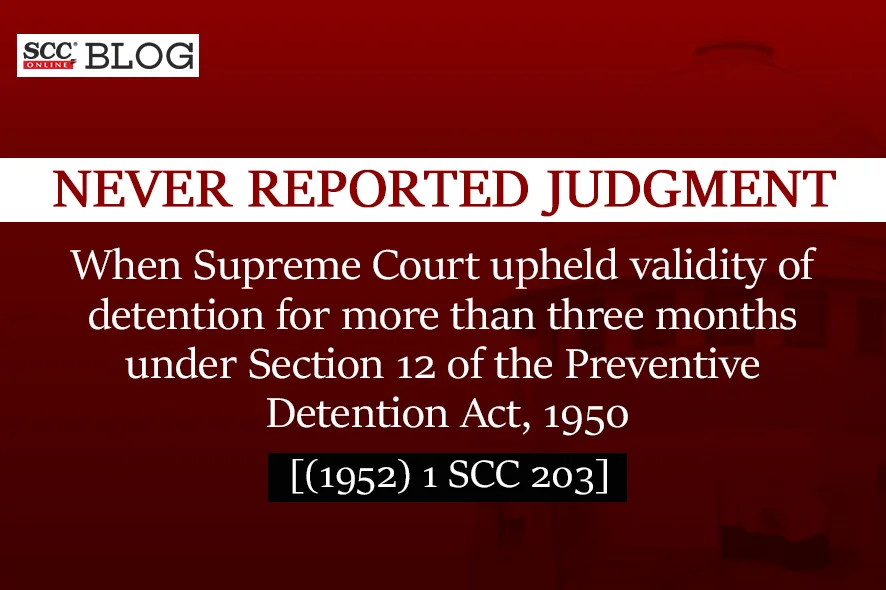Supreme Court: In a case wherein the validity of orders passed by the District Magistrate of Amritsar (‘DM') on 6-12-1950 and on 28-3-1951 was challenged, the 3-Judges Bench of Fazl Ali*, B.K. Mukherjea, and Vivian Bose, JJ., opined that the detention order was in conformity with the provisions of Section 12 of the Preventive Detention Act, 1950 (‘the Act') and the Preventive Detention (Amendment) Act, 1951 (‘Amendment Act') and accordingly dismissed the petition.
Background
In the instant case, the DM issued an order on 04-08-1950 for the arrest of the petitioner, wherein it was stated that with a view to prevent the petitioner from acting in a manner prejudicial to the security of the State or the maintenance of public order, it was necessary to arrest and detain him.
The petitioner was arrested on 4-11-1950, and the grounds of detention were served on him on the 16-11-1950. Subsequently, on 16-11-1950, the DM issued an order under Section 4 of the Act, directing the petitioner to be committed to police custody till 13-2-1951.
On 6-12-1950, his detention was extended till 31-3-1951, and again on 8-2-1951, an order was passed by the DM which directed the petitioner to be committed to the custody of the Inspector General of Prisons, Punjab, for being kept in jail from 10-02-1951 until 31-3-1951.
Subsequently, on 28-3-1951, the DM issued an order extending the period of detention of the petitioner till further orders. Thereafter, the petitioner’s case was referred to the Advisory Board under the Amendment Act, and on the report of that Board, his detention was confirmed.
Thus, the writ petition was filed by the petitioner to challenge the validity of the orders passed by the DM on 6-12-1950 and on 28-3-1951.
Analysis, Law, and Decision
The Supreme Court opined that the petitioner's contention that the DM was not authorised to order the petitioner’s detention for more than three months, did not take note of the fact that under Section 12 of the Act, persons who were found to be acting in a manner prejudicial to the security of the State or the maintenance of public order could be detained for more than 3 months without their cases being referred to the Advisory Board.
Further, with regard to the petitioner's contention that the DM had no power to extend the period of detention beyond 31-3-1951, vide Order dated 28-03-1951, the Supreme Court opined that the Order in question merely amounted to direct the petitioner to be detained till further orders. The Supreme Court further opined that the word “extended” in the Order had no other meaning than that the petitioner’s detention would continue under the new Amendment Act and such order was in conformity with the provisions of Section 12 of the Amendment Act, which provided that “every order in force at the commencement of the Amendment Act, shall continue in force and shall have effect as if it had been made under the Act as amended by the Amendment Act”. Thus, the Supreme Court held that after this order, the petitioner's case was referred to the Advisory Board as provided in the Amendment Act, and the procedure established by law was duly complied with.
The Supreme Court opined that the petitioner's contention that the order of 4-08-1950 was not an order of detention and had been wrongly treated, had no substance. The Supreme Court opined that the Order recited that it was necessary to arrest and detain the petitioner, and he was directed to be arrested for the purpose of being detained. The petitioner was actually detained as soon as he was arrested by the force of the Order. In any event the Order of detention of 28-3-1951, which was passed under the Amendment Act was not liable to be questioned, and the present detention of the petitioner could not be held to be illegal.
Accordingly, the Supreme Court dismissed the petition.
[Prem Singh v. State of Punjab, (1952) 1 SCC 203, decided on 26-02-1952]
Note: National Security Act, 1980
The reference to Advisory Boards is covered under Section 10 of the National Security Act, 1980 (‘NSA') as the Preventive Detention Act, 1950 has now been repealed. Section 13 of the NSA specifies that the maximum period of detention can be twelve months from the date of detention. Further, Section 3 of the NSA specifies about the power to make orders detaining certain persons and Section 8 of the NSA mentions grounds of order of detention to be disclosed to persons affected by the order.
*Judgment by- Justice Fazl Ali
Advocates who appeared in this case :
For the Petitioners: Raghbir Singh (Amicus Curiae) Senior Advocate
For the Respondents: Jindra Lal, Advocate






